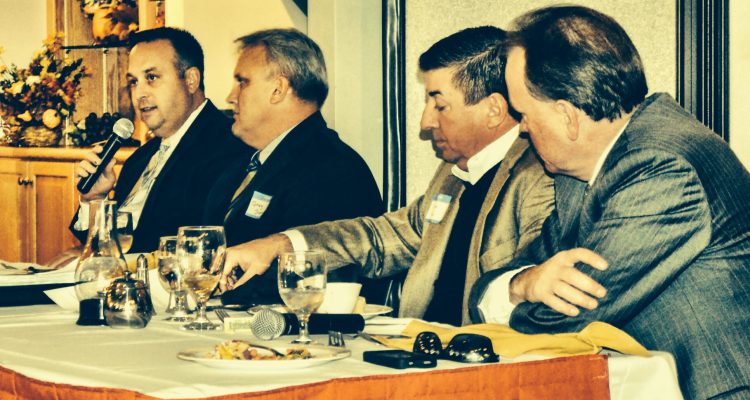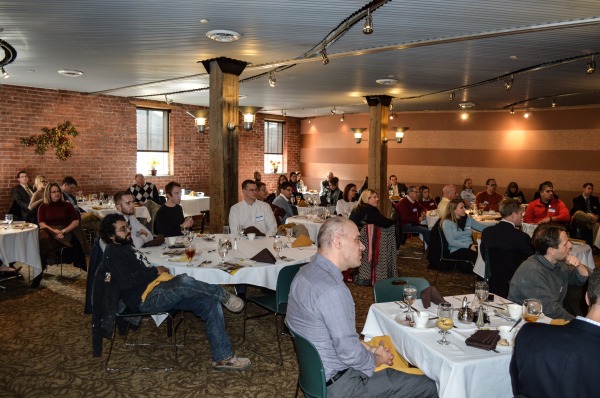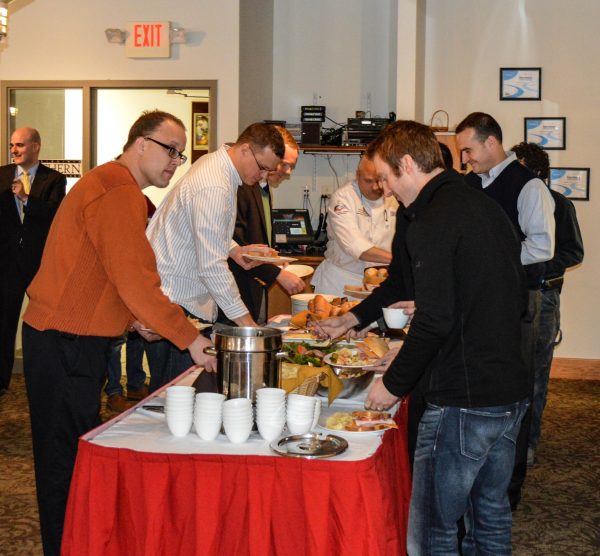Wheeling Mayor Andy McKenzie, Ohio County Administrator Greg Stewart, Vice Mayor Gene Fahey, and City Manager Robert Herron interacted with nearly 50 folks who attended the second annual OV Connect-City of Wheeling Government Lunch on Friday at WVNCC’s Culinary Arts dining room.
By Steve Novotney
Weelunk.com
Government leaders from the city of Wheeling and Ohio County interacted with close to 50 members and non-members of OV Connect Friday during the non-profit’s second annual City of Wheeling Government Lunch at West Virginia Northern Community College’s Culinary Arts dining room.
Wheeling Mayor Andy McKenzie, Vice Mayor Gene Fahey, City Manager Robert Herron, and Ohio County Administrator Greg Stewart answered questions brought forth by those in attendance. OV Connect board member John Aderholt served as the event’s moderator, and the topics covered included everything from future development to the county’s housing issues.
Here are several of the questions posed to the government leaders and the answers they offered (note – these are not direct quotes).
Q: The Comprehensive Plan was recently presented to members of city council and the mayor. What do you expect will actually happen that is included within that plan?
McKenzie: The first thing I think everyone needs to understand is that the Comprehensive Plan is a process that is mandated by state law. As most of the people in the room know, I am not a big fan of studies because far too often in the past the city has paid the money for it, and then all it has done is sit on a shelf.
The Comprehensive Plan includes a lot of great things, including land use, the focus on the downtown, and what the issues are in all areas of our city.
This effort is more of a grassroots effort, and I know the members of council are looking forward to sitting down together so we can determine what we can do now to assist with making a lot of the ideas come true.
Q: What is the current situation with the budget for the city of Wheeling?
Fahey: It was about seven or eight months ago when the city manager came to council and told us that we were going to have a lot of tough decisions to make. The way it looked, we knew there would have to be a lot of restructuring along with the elimination of some positions within city government.
Looking at the long-term future, we knew we had to address the pension issue with our fire and police departments because of the new payment schedule adopted by the state legislature. Then we realized it was really a twofold problem – the pension issue and right-sizing government.
We’ve discussed the suggestion of a User’s Fee and an increase in the sales tax because, in the end, we have to address the pension to ensure the future financial solvency of the city.
Nearly 50 members and non-members of OV Connect attended Friday’s luncheon to pose their questions to city and county leaders, and to hear those officials answer the inquiries.
Q: Can you offer us an update on the construction that is taking place on Market Plaza?
Herron: My understanding is the construction company will complete the south end of Market Plaza before winter really sets in, and then they will return in the spring to complete the north end of the plaza.
It’s a $700,000 project, and the city also performed about $400,000 worth of work on the water lines in that area before it got started. The plaza will have more walkways and planting areas, and there will be more parking along Market Street.
Q: What can be done by government to help this area with the housing shortage in Ohio County?
Stewart: We have identified that Ohio County does need more housing, and one need is that range of homes between $150,000 and $275,000. I know we are attracting a lot of young people to the county right now, but they may not want to buy a house in Woodsdale because they aren’t looking for a fixer-upper. Instead, they are looking for something that is brand new and won’t need any work for the next 15 years.
We have had some lookers in the area of The Highlands, and there are a couple of farms that are on east and west sides of the Highlands where something could happen in the future. And the county would do whatever we would have to in order to assist those developers.
Fahey: The biggest challenge for Wheeling when it comes to housing is the terrain. There are some areas in the city where new housing could take place, but there are no larger areas like there are inn Ohio County. The open land is outside of the city.
Q: A lot of development has been taking place at The Highlands. What can we expect in the future?
Stewart: I’m sure folks have seen the moving of land in the lot next to Fusion, and that’s because there are going to be a couple of new businesses locating in that area in the spring.
There is a hotel that will be constructed in the area behind Cheddars, and we have also been involved with some discussions about the development of a conference center in that area.
And we are working at a slow pace on the second interchange for The Highlands. The legislature passed a bill recently that will help us with that project, but there will not be any traffic on that roadway for at least three to five years.
Q: As far as moving into the future, what can we do to help the process move along?
McKenzie: Get involved. We need people to stand up and want to make it better.
We have to see young people get involved. When I was first elected to the West Virginia Senate, I was 26 years old, and most of the other legislators were in their 60s. We need more of that to happen in the city of Wheeling.
Fahey: Government can help, but we as the people of this community must reinvest in ourselves, and we can’t let those who insist on being negative wear us down. If the majority of people in this community are positive, then we will wear the negative folks down.
Herron: I think we all realize there’s a growing enthusiasm in Wheeling and Ohio County right now, and one of the reasons for that involves the people in this room.





